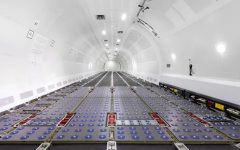 “Continued investments in infra development, including modern warehouses, cold storage facilities, and transportation networks, will be crucial,” shares Arif A Siddiqui, Founder & Director, Coign Consulting, Vice President, Warehousing Association of India (WAI). “This will involve both public and private sector participation to enhance efficiency and connectivity across the country. The integration of advanced technologies like IoT, AI, automation, and data analytics will optimize warehouse operations, improve inventory management, and enhance overall supply chain visibility and efficiency,” He adds With the increasing demand for faster and more reliable delivery services, there will be a focus on developing last-mile delivery solutions, including alternative delivery methods like drones and autonomous vehicles, especially in urban areas. Environmental concerns and sustainability will become more prominent in the warehousing and logistics sector. Adoption of eco-friendly practices such as green buildings, electric vehicles, and efficient energy management will be encouraged. Continued efforts in regulatory reforms, including simplification of tax structures, state logistics policies, faster clearance, and approval procedures, and streamlining of transportation regulations, will further boost the growth of the sector and attract more investment. Strengthening ties with global markets and integrating into global supply chains will open up new opportunities for Indian warehousing and logistics companies, driving further growth and competitiveness. Overall, the Indian warehousing and logistics sector is poised for continued growth in the coming years, driven by factors such as increasing consumer demand, technological advancements, infrastructure development, and favourable government policies. However, addressing challenges such as infrastructure bottlenecks, regulatory hurdles, and skill shortages will be crucial to realizing the full potential of the sector.
“Continued investments in infra development, including modern warehouses, cold storage facilities, and transportation networks, will be crucial,” shares Arif A Siddiqui, Founder & Director, Coign Consulting, Vice President, Warehousing Association of India (WAI). “This will involve both public and private sector participation to enhance efficiency and connectivity across the country. The integration of advanced technologies like IoT, AI, automation, and data analytics will optimize warehouse operations, improve inventory management, and enhance overall supply chain visibility and efficiency,” He adds With the increasing demand for faster and more reliable delivery services, there will be a focus on developing last-mile delivery solutions, including alternative delivery methods like drones and autonomous vehicles, especially in urban areas. Environmental concerns and sustainability will become more prominent in the warehousing and logistics sector. Adoption of eco-friendly practices such as green buildings, electric vehicles, and efficient energy management will be encouraged. Continued efforts in regulatory reforms, including simplification of tax structures, state logistics policies, faster clearance, and approval procedures, and streamlining of transportation regulations, will further boost the growth of the sector and attract more investment. Strengthening ties with global markets and integrating into global supply chains will open up new opportunities for Indian warehousing and logistics companies, driving further growth and competitiveness. Overall, the Indian warehousing and logistics sector is poised for continued growth in the coming years, driven by factors such as increasing consumer demand, technological advancements, infrastructure development, and favourable government policies. However, addressing challenges such as infrastructure bottlenecks, regulatory hurdles, and skill shortages will be crucial to realizing the full potential of the sector.
Breaking News
- ‘Kerala, Telangana, UP have seen huge domestic cargo & warehousing growth’
- Saudia Cargo extends WFS handling partnership across Europe & US
- AEI secures DGCA approval for 737-800SF conversion
- Air cargo rates climb as peak season builds, though volatility eases: WorldACD
- IATA Survey shows strong industry momentum behind ONE Record
- Softlink Global unveils next-gen AI & automation capabilities
- Cargo Flash, RwandAir Cargo partner to boost digital efficiency
- GSV, Amazon sign MoU to boost express deliveries across India
- ‘Freighter shortage becomes a critical industry challenge’
- ‘India needs freighters to power Its export surge’
- ‘India needs modern freighters to meet 2030 cargo ambition’
 Cargo Breaking News
Cargo Breaking News


